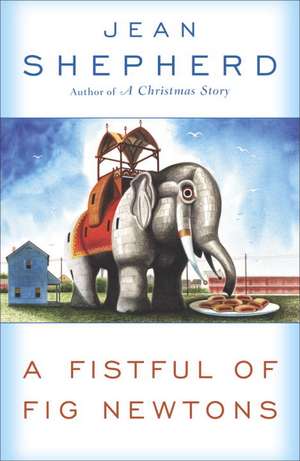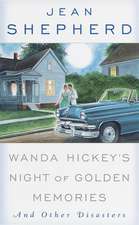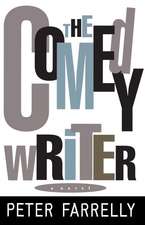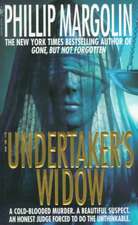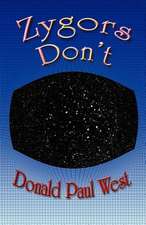A Fistful of Fig Newtons
Autor Jean Shepherden Limba Engleză Paperback – 30 sep 2004
Preț: 110.60 lei
Nou
Puncte Express: 166
Preț estimativ în valută:
21.16€ • 22.14$ • 17.58£
21.16€ • 22.14$ • 17.58£
Carte disponibilă
Livrare economică 12-26 martie
Preluare comenzi: 021 569.72.76
Specificații
ISBN-13: 9780385188432
ISBN-10: 0385188439
Pagini: 284
Dimensiuni: 132 x 203 x 15 mm
Greutate: 0.32 kg
Editura: Main Street Books
ISBN-10: 0385188439
Pagini: 284
Dimensiuni: 132 x 203 x 15 mm
Greutate: 0.32 kg
Editura: Main Street Books
Extras
You let other women make a fool of you . . .
I banged on the steering wheel as Peggy Lee belted it out in her mean, silky, snotty, "get me some money" voice.
"YEAH, YEAH!" I hollered stupidly as Billy Butterfield's trumpet rasped out the bridge.
You sit there won'drin' what it's all about . . .
Stuck in rush-hour traffic, the maniac in you takes over. The mouth of the Lincoln Tunnel was four blocks and two thousand cars away.
My radio was tuned to WNEW, the only station that the bastard can get in midtown Manhattan. In a way, that curious misfortune might have been one cause of what was to follow. WNEW is an instant time warp leap into the past. A flick of the knob and you're magically back in the 1940s and '50s of Peggy Lee, Dinah Shore, Ella Fitzgerald, and a lot of singers who haven't made a record since Eisenhower retired to Gettysburg.
My mind ticked over idly. I hummed, I whistled, I spit out the window.
You sit there won'drin' what it's all about . . .
The radio buzzed obscenely, a rank, juicy Bronx cheer of a buzz, and quit. God dammit! I thumped my fist on the plastic dashboard, sending up motes of cigarette ashes from the ashtray, but the radio remained as silent as a dime-store Buddha incense-burner. If there is ever a time when you need a car radio to keep you company, it's in a long line of creeping traffic.
I thumped the dash. No luck. All the while my eyes were darting back and forth over the traffic; left, right, rear mirror, right, left, rear mirror, clickety-click-click, in the style of the true urban driver. There's always a yellow cab or a Puerto Rican in a battered van, marked ACE PLUMBING SUPPLIES, ready to beat you out for every precious inch. Nerves is what it takes, nerves of steel; cobalt steel. Fighting your way to the mouth of the Lincoln Tunnel at rush hour is no place for lady drivers with blue hair or frail stockbrokers with rimless bifocals.
An airport bus sent a blast of diesel fumes that caught me fair and square, a clean shot.
"Braak, braaak"-my city cough rattled my ribs. "BORK!"
Suddenly there was a brief opening ahead. I shot forward, skittered through the line like an NFL halfback and gained a full car length on a cursing Connecticut driver who got caught lighting his cigar. I cackled. I could see him in my rear mirror mouthing evil words. I threw him a quick finger and whipped up next to a looming tractor-trailer. I was grateful for a moment or two of shade. I was actually within striking distance of the tunnel mouth itself, at last.
The streams of traffic, in five or six lines, edged into the evil black mouth. Theoretically, there is supposed to be a system for alternate cars to go forward into the tunnel, each in his turn, but like everything else in the urban jungle of today, that system is an outmoded joke, like taking off your hat in an elevator or opening doors for women.
I had a brief image of a hulking giant trying to put toothpaste back into a Colgate tube as I hunched over my wheel, deep in battle. I saw my chance. A tiny opening between a big, blue clunker of a Buick Riviera and a puttering Valiant. I slammed the transmission into LOW-LOW, floored the accelerator.
ZZZzziiiiPP! I made it, I made it! Whoopee! I was in the tunnel!
Two snakelike lines of traffic inched through this gloomy tile-and-concrete alimentary canal, the lower colon of the city of New York spewing its waste out into New Jersey.
The tunnel jogged slightly to the left. The entrance behind me disappeared. I was now far below the sinister, sludgy waters of the mighty Hudson. God only knows what indescribable obscenities lay above me, protected only by a thin shield of rusting steel and crumbling concrete. Hardly a soul alive today remembers when the ancient tunnel was built. Dimly lit by yellow bulbs, the tunnel lives in a perpetual basement gloom. No dawn, no sunset, no spring or summer, fall or winter; only Man and the rats inhabit this man-made wonder of nature.
It affects people in many ways. I once knew a man who was in every way a civilized creature, the product of centuries of Western culture-Yale, Skull & Bones, a reader of John Updike, a subscriber to the opera-who had one fatal flaw. The instant he entered the tunnel he reverted to his ancient Paleolithic forebears. Deep fears gripped him. He saw lurking carnivores with yellow eyes in the shadows. Perspiration gushed from his every pore. Each minute in the tunnel was sheer hell. It finally got so bad that he sold his elegant ancestral home in Princeton, moved to a cockroach-infested, furnished flat in Manhattan, where he remains today, a prisoner of the Island.
Other victims of tunnel madness have an uncontrollable urge to blow their horns, apparently in the feeble hope that the echoing din will reassure them that they are still alive. I've always thought that a deep study of the effect of long, sinister tunnels on the mind of commuters would be a valuable one, perhaps giving us a clue to the rising incidence of madness, breakdowns, and broken marriages among ex-urbanites.
I crept forward. Overhead, little yellow lights blinked, indicating some poor bastard was in trouble ahead.
Purgatory. That's what the tunnel is. I'm suspended between heaven and hell; no time, no seasons, accompanied only by my sins and fears. My personal tunnel defense has evolved over years of driving. I let my mind roam free as a bird, shutting out the gloomy Now.
Ahead of me in a heavily souped-up Dodge Charger (a true Kid car), a crowd of male college students swilled cans of Budweiser. A peeling decal on the rear window read RUTGERS SCARLET KNIGHTS GO! I could see a hulking undergraduate in the rear seat, blowing large pink bubbles of the finest Fleers. He wore a scarlet-and-black Rutgers T-shirt with the numerals 69 obscenely emblazoned for the world to see. The bubble burst, draping his nose with pink, rubbery chewing gum.
"Ah," I muttered, "the cream of our youth, the future hope of America."
A can flew out of the window and bounced off the tile walls of the tunnel, ricocheting onto my hood where it dug a neat gouge in the expensive paint.
"Hey, Sixty-nine, you slob!" I yelled into the echoing din; fruitlessly, of course. My tunnel-loosened mind darted nimbly to another T-shirt, another university many states away.
Old Number 76, where is he today? My mind savored his Armageddon, his defeat, his disgrace.
A Fistful
of Fig Newtons
or
the Shoot-Out
in Room 303
The squat, chunky glass nestled chill and reassuring in my hand. It was one of my treasured set of matched old-fashioned glasses celebrating the long-past Bicentennial of our blessed land. Each tumbler bore in magnificent cut-glass bas-relief a portrait of a Founding Father. Thomas Jefferson, his face stern and yet patriotically inspiring, sweated slightly on the side of my icy glass. Under his portrait, etched with authority, was a quote from the Great Democrat himself:
I believe in The People.
I stood at the window of my fourteenth-story apartment and stared listlessly out into the gathering gloom. Far below me were hordes of wandering picketers, their signs waving in the dusk, distance muting their hoarse obscenities. Occasionally a siren wailed, accompanied by the distant wink of red flashers. The apartment lights dimmed momentarily but struggled bravely back on, narrowly averting the third blackout of the week. The Jack Daniels glowed deep in my interior. Going about its therapeutic work, it warmed me.
I glanced down at Jefferson, whose ear was just under my right thumb.
"Tom, I'm not sure it's working out."
Another muttering wave of distant protest filtered through my dusty venetian blinds. One of the problems of living fourteen stories above the city is that you tend to see things too clearly, especially after a jot or two of bourbon. Down on the street, amid the pitched battles for survival, you get caught up in the fray. In the continuous pinball game of life, shouldering old ladies aside for a vacant cab, thumping children in the ribs for a seat on the subway, kneeing a nun in the groin for the last remaining hot pretzel engrosses you and you fail to see, ultimately, that the whole damn thing is falling apart. But high over the city, after a desperate Friday at the office and the final flurry of insulting memos to cap the day, the vision sharpens; the mind tears aside the veil of wishful thinking, and there it is.
Incidentally, you can call me Dave if you like. That's not my real name, but I prefer to remain anonymous, for reasons that will become obvious.
I sipped more bourbon and, struck by a sudden transient urge, ripped the cover off the current issue of New York with its gleaming white headline reading: 101 Free FUN Things to Do in the City! With smooth, adept, practiced skill I quickly folded the cover into a paper airplane. It was an art which I had not used in many years, and one which I had perfected grade after grade at the Warren G. Harding School. I fished around in one of the rickety, creaky drawers of my Swedish Moderne Finish-It-Yourself desk and found a red felt-tip marker which had insolently leaked over a pile of unpaid bills. I quickly scrawled on one wing of my airplane:
Look out-I'm coming to get all of you.
On the other wing, I signed: GOD.
It looked good. Inching my window open a crack so as not to let in too much soot and noxious carbon compounds, I launched the plane out into the darkened canyon. It rose swiftly on an updraft, banked to the left, and began gracefully volplaning down, bearing with it my hopes for a better world. Down, down it drifted until, finally lost from view, it disappeared into the mob. A few white faces suddenly peered up at me. It might have been imagination, but they seemed frightened. One face, however, mouthed a foul word.
"And the same to you, Jack, with bells on it."
I smiled my carefully cultivated Dick Cavett smirk and settled squashily into my amazingly uncomfortable bean-bag loveseat. A distant phone tinkled and I knew that the elderly maiden lady who lived in the next apartment was getting the first of her nightly obscene phone calls. Even chaos and barbaric anarchy have their routines.
The morning's Times lay scattered about my feet. ALL THE NEWS THAT'S FIT TO PRINT: hostages, wars, perversions, the crossword puzzle, which had lately itself begun to reflect the age; an occasional shocking four-letter word creeping in here and there: Reston's calm voice daily chastising the world for its follies.
I flipped the switch on my TV set, the Cassandra of our days. Mayor Koch's face appeared, his white shirt rumpled with sweat, his tie hanging at half-mast. Flashbulbs popped. His eyes rolled wildly in the glare.
I muttered: "By God, he still looks like Frank Perdue, the Chicken King."
"I have informed the strikers' representatives that this city can no longer tolerate . . ."
I flipped the channel. Koch again. Another flip; another Koch. On all the channels nothing but Koches. If Karl Marx were alive today, he would have written: ABC is the opiate of The Masses.
Then I knew what I had to do. Desperation has its limits. My hand turned the channel selector to that one island of total, tranquil, heart-warming escapism: Public Television. Where else can you relive the entire Victorian era in endless reruns, a world peopled with simple, honest maids and butlers, and square-jawed English squires? Occasionally the fare shifts even further back in time and Shakespeare's Henry V rides out again into battle, but such fun, poetic battles. French chefs eternally prepare arcane treats featuring fish available only off the coast of Normandy and then for only a fortnight out of the year, when they are running. I settled back, prepared to enjoy an hour or two of total, heavily endowed Culture.
"The following PBS program was made possible by a grant from the Mobil Corporation."
"Aha," I hissed, "the Petroleum Broadcasting System is still greasing the ways."
A blast of atonal, formless electronic music consisting of a series of a-rhythmic beeps and assorted transistorized hooting, the kind of fanfare that always precedes a "serious" program on PBS, filled the room. The credits unrolled endlessly, a series of tricky little exploding letters, where most of the rich endowments go. Jazzy titles ain't cheap.
" 'America . . . [Pause. Another blast of beeps] the Aesthetics of Transition . . .' [Pause. Assorted hoots] the sixth program in a series of twenty-four . . . [More credits exploded into multicolored space] moderated by Alistair Cooke."
I settled back deeper into my bean bag, wondering briefly why every program about America is hosted by an Englishman and knowing damn well that the reverse certainly wasn't true, that the BBC would never use Jack Lemmon to discuss the Plantagenet line.
Mr. Cooke's calm face appeared. In the background, an imposing wall of heavy leather-bound volumes gave the scene weight and depth. As his cultured tones, cool, calm, unemotional, droned, I reached down to the floor for my Jack Daniels bottle. Several cockroaches retreated hastily. More sirens wailed, punctuated by the furious klaxons bearing the wounded to Bellevue.
"Our guest tonight is the distinguished visiting lecturer at the University of Chicago . . ."
Another face appeared on the screen, smiling with well-bred diffidence, a face clearly at home amid the dusty stacks, a face obviously prepared to hold its own in the highest literary soirees in the land. I leaned forward, the expensive lima beans beneath my rump rattling and tinkling as they sought other positions of discomfort.
By God, I knew that face, that cool smile, that drooping left eye, that rumpled tweed jacket with its faint but heavy growth of moss. I knew that face! Was it the bourbon? Was it another symptom of my approaching madness?
"Dr. Umbaugh, we are pleased and honored to have the privilege of discussing the aesthetics of frontier courage and the emergence of . . ."
Good Christ Almighty! Umbaugh! UMBAUGH! Good God! I clutched the Great Democrat tightly and took a mighty swig, followed immediately by an uncontrolled belch.
". . . why yes, Mr. Cooke, the unique talent and attitude bred on the frontier of barbarian America were the result of many factors. Chief among them, I must say, was cosmic Boredom, and . . ."
I struggled to my feet. Umbaugh, you son of a bitch! Tell 'em, you bastard, tell 'em!
I threw a pair of ice cubes into my glass, eager to listen to the words of the most taleted, nay, fiercely courageous man I had ever known.
I banged on the steering wheel as Peggy Lee belted it out in her mean, silky, snotty, "get me some money" voice.
"YEAH, YEAH!" I hollered stupidly as Billy Butterfield's trumpet rasped out the bridge.
You sit there won'drin' what it's all about . . .
Stuck in rush-hour traffic, the maniac in you takes over. The mouth of the Lincoln Tunnel was four blocks and two thousand cars away.
My radio was tuned to WNEW, the only station that the bastard can get in midtown Manhattan. In a way, that curious misfortune might have been one cause of what was to follow. WNEW is an instant time warp leap into the past. A flick of the knob and you're magically back in the 1940s and '50s of Peggy Lee, Dinah Shore, Ella Fitzgerald, and a lot of singers who haven't made a record since Eisenhower retired to Gettysburg.
My mind ticked over idly. I hummed, I whistled, I spit out the window.
You sit there won'drin' what it's all about . . .
The radio buzzed obscenely, a rank, juicy Bronx cheer of a buzz, and quit. God dammit! I thumped my fist on the plastic dashboard, sending up motes of cigarette ashes from the ashtray, but the radio remained as silent as a dime-store Buddha incense-burner. If there is ever a time when you need a car radio to keep you company, it's in a long line of creeping traffic.
I thumped the dash. No luck. All the while my eyes were darting back and forth over the traffic; left, right, rear mirror, right, left, rear mirror, clickety-click-click, in the style of the true urban driver. There's always a yellow cab or a Puerto Rican in a battered van, marked ACE PLUMBING SUPPLIES, ready to beat you out for every precious inch. Nerves is what it takes, nerves of steel; cobalt steel. Fighting your way to the mouth of the Lincoln Tunnel at rush hour is no place for lady drivers with blue hair or frail stockbrokers with rimless bifocals.
An airport bus sent a blast of diesel fumes that caught me fair and square, a clean shot.
"Braak, braaak"-my city cough rattled my ribs. "BORK!"
Suddenly there was a brief opening ahead. I shot forward, skittered through the line like an NFL halfback and gained a full car length on a cursing Connecticut driver who got caught lighting his cigar. I cackled. I could see him in my rear mirror mouthing evil words. I threw him a quick finger and whipped up next to a looming tractor-trailer. I was grateful for a moment or two of shade. I was actually within striking distance of the tunnel mouth itself, at last.
The streams of traffic, in five or six lines, edged into the evil black mouth. Theoretically, there is supposed to be a system for alternate cars to go forward into the tunnel, each in his turn, but like everything else in the urban jungle of today, that system is an outmoded joke, like taking off your hat in an elevator or opening doors for women.
I had a brief image of a hulking giant trying to put toothpaste back into a Colgate tube as I hunched over my wheel, deep in battle. I saw my chance. A tiny opening between a big, blue clunker of a Buick Riviera and a puttering Valiant. I slammed the transmission into LOW-LOW, floored the accelerator.
ZZZzziiiiPP! I made it, I made it! Whoopee! I was in the tunnel!
Two snakelike lines of traffic inched through this gloomy tile-and-concrete alimentary canal, the lower colon of the city of New York spewing its waste out into New Jersey.
The tunnel jogged slightly to the left. The entrance behind me disappeared. I was now far below the sinister, sludgy waters of the mighty Hudson. God only knows what indescribable obscenities lay above me, protected only by a thin shield of rusting steel and crumbling concrete. Hardly a soul alive today remembers when the ancient tunnel was built. Dimly lit by yellow bulbs, the tunnel lives in a perpetual basement gloom. No dawn, no sunset, no spring or summer, fall or winter; only Man and the rats inhabit this man-made wonder of nature.
It affects people in many ways. I once knew a man who was in every way a civilized creature, the product of centuries of Western culture-Yale, Skull & Bones, a reader of John Updike, a subscriber to the opera-who had one fatal flaw. The instant he entered the tunnel he reverted to his ancient Paleolithic forebears. Deep fears gripped him. He saw lurking carnivores with yellow eyes in the shadows. Perspiration gushed from his every pore. Each minute in the tunnel was sheer hell. It finally got so bad that he sold his elegant ancestral home in Princeton, moved to a cockroach-infested, furnished flat in Manhattan, where he remains today, a prisoner of the Island.
Other victims of tunnel madness have an uncontrollable urge to blow their horns, apparently in the feeble hope that the echoing din will reassure them that they are still alive. I've always thought that a deep study of the effect of long, sinister tunnels on the mind of commuters would be a valuable one, perhaps giving us a clue to the rising incidence of madness, breakdowns, and broken marriages among ex-urbanites.
I crept forward. Overhead, little yellow lights blinked, indicating some poor bastard was in trouble ahead.
Purgatory. That's what the tunnel is. I'm suspended between heaven and hell; no time, no seasons, accompanied only by my sins and fears. My personal tunnel defense has evolved over years of driving. I let my mind roam free as a bird, shutting out the gloomy Now.
Ahead of me in a heavily souped-up Dodge Charger (a true Kid car), a crowd of male college students swilled cans of Budweiser. A peeling decal on the rear window read RUTGERS SCARLET KNIGHTS GO! I could see a hulking undergraduate in the rear seat, blowing large pink bubbles of the finest Fleers. He wore a scarlet-and-black Rutgers T-shirt with the numerals 69 obscenely emblazoned for the world to see. The bubble burst, draping his nose with pink, rubbery chewing gum.
"Ah," I muttered, "the cream of our youth, the future hope of America."
A can flew out of the window and bounced off the tile walls of the tunnel, ricocheting onto my hood where it dug a neat gouge in the expensive paint.
"Hey, Sixty-nine, you slob!" I yelled into the echoing din; fruitlessly, of course. My tunnel-loosened mind darted nimbly to another T-shirt, another university many states away.
Old Number 76, where is he today? My mind savored his Armageddon, his defeat, his disgrace.
A Fistful
of Fig Newtons
or
the Shoot-Out
in Room 303
The squat, chunky glass nestled chill and reassuring in my hand. It was one of my treasured set of matched old-fashioned glasses celebrating the long-past Bicentennial of our blessed land. Each tumbler bore in magnificent cut-glass bas-relief a portrait of a Founding Father. Thomas Jefferson, his face stern and yet patriotically inspiring, sweated slightly on the side of my icy glass. Under his portrait, etched with authority, was a quote from the Great Democrat himself:
I believe in The People.
I stood at the window of my fourteenth-story apartment and stared listlessly out into the gathering gloom. Far below me were hordes of wandering picketers, their signs waving in the dusk, distance muting their hoarse obscenities. Occasionally a siren wailed, accompanied by the distant wink of red flashers. The apartment lights dimmed momentarily but struggled bravely back on, narrowly averting the third blackout of the week. The Jack Daniels glowed deep in my interior. Going about its therapeutic work, it warmed me.
I glanced down at Jefferson, whose ear was just under my right thumb.
"Tom, I'm not sure it's working out."
Another muttering wave of distant protest filtered through my dusty venetian blinds. One of the problems of living fourteen stories above the city is that you tend to see things too clearly, especially after a jot or two of bourbon. Down on the street, amid the pitched battles for survival, you get caught up in the fray. In the continuous pinball game of life, shouldering old ladies aside for a vacant cab, thumping children in the ribs for a seat on the subway, kneeing a nun in the groin for the last remaining hot pretzel engrosses you and you fail to see, ultimately, that the whole damn thing is falling apart. But high over the city, after a desperate Friday at the office and the final flurry of insulting memos to cap the day, the vision sharpens; the mind tears aside the veil of wishful thinking, and there it is.
Incidentally, you can call me Dave if you like. That's not my real name, but I prefer to remain anonymous, for reasons that will become obvious.
I sipped more bourbon and, struck by a sudden transient urge, ripped the cover off the current issue of New York with its gleaming white headline reading: 101 Free FUN Things to Do in the City! With smooth, adept, practiced skill I quickly folded the cover into a paper airplane. It was an art which I had not used in many years, and one which I had perfected grade after grade at the Warren G. Harding School. I fished around in one of the rickety, creaky drawers of my Swedish Moderne Finish-It-Yourself desk and found a red felt-tip marker which had insolently leaked over a pile of unpaid bills. I quickly scrawled on one wing of my airplane:
Look out-I'm coming to get all of you.
On the other wing, I signed: GOD.
It looked good. Inching my window open a crack so as not to let in too much soot and noxious carbon compounds, I launched the plane out into the darkened canyon. It rose swiftly on an updraft, banked to the left, and began gracefully volplaning down, bearing with it my hopes for a better world. Down, down it drifted until, finally lost from view, it disappeared into the mob. A few white faces suddenly peered up at me. It might have been imagination, but they seemed frightened. One face, however, mouthed a foul word.
"And the same to you, Jack, with bells on it."
I smiled my carefully cultivated Dick Cavett smirk and settled squashily into my amazingly uncomfortable bean-bag loveseat. A distant phone tinkled and I knew that the elderly maiden lady who lived in the next apartment was getting the first of her nightly obscene phone calls. Even chaos and barbaric anarchy have their routines.
The morning's Times lay scattered about my feet. ALL THE NEWS THAT'S FIT TO PRINT: hostages, wars, perversions, the crossword puzzle, which had lately itself begun to reflect the age; an occasional shocking four-letter word creeping in here and there: Reston's calm voice daily chastising the world for its follies.
I flipped the switch on my TV set, the Cassandra of our days. Mayor Koch's face appeared, his white shirt rumpled with sweat, his tie hanging at half-mast. Flashbulbs popped. His eyes rolled wildly in the glare.
I muttered: "By God, he still looks like Frank Perdue, the Chicken King."
"I have informed the strikers' representatives that this city can no longer tolerate . . ."
I flipped the channel. Koch again. Another flip; another Koch. On all the channels nothing but Koches. If Karl Marx were alive today, he would have written: ABC is the opiate of The Masses.
Then I knew what I had to do. Desperation has its limits. My hand turned the channel selector to that one island of total, tranquil, heart-warming escapism: Public Television. Where else can you relive the entire Victorian era in endless reruns, a world peopled with simple, honest maids and butlers, and square-jawed English squires? Occasionally the fare shifts even further back in time and Shakespeare's Henry V rides out again into battle, but such fun, poetic battles. French chefs eternally prepare arcane treats featuring fish available only off the coast of Normandy and then for only a fortnight out of the year, when they are running. I settled back, prepared to enjoy an hour or two of total, heavily endowed Culture.
"The following PBS program was made possible by a grant from the Mobil Corporation."
"Aha," I hissed, "the Petroleum Broadcasting System is still greasing the ways."
A blast of atonal, formless electronic music consisting of a series of a-rhythmic beeps and assorted transistorized hooting, the kind of fanfare that always precedes a "serious" program on PBS, filled the room. The credits unrolled endlessly, a series of tricky little exploding letters, where most of the rich endowments go. Jazzy titles ain't cheap.
" 'America . . . [Pause. Another blast of beeps] the Aesthetics of Transition . . .' [Pause. Assorted hoots] the sixth program in a series of twenty-four . . . [More credits exploded into multicolored space] moderated by Alistair Cooke."
I settled back deeper into my bean bag, wondering briefly why every program about America is hosted by an Englishman and knowing damn well that the reverse certainly wasn't true, that the BBC would never use Jack Lemmon to discuss the Plantagenet line.
Mr. Cooke's calm face appeared. In the background, an imposing wall of heavy leather-bound volumes gave the scene weight and depth. As his cultured tones, cool, calm, unemotional, droned, I reached down to the floor for my Jack Daniels bottle. Several cockroaches retreated hastily. More sirens wailed, punctuated by the furious klaxons bearing the wounded to Bellevue.
"Our guest tonight is the distinguished visiting lecturer at the University of Chicago . . ."
Another face appeared on the screen, smiling with well-bred diffidence, a face clearly at home amid the dusty stacks, a face obviously prepared to hold its own in the highest literary soirees in the land. I leaned forward, the expensive lima beans beneath my rump rattling and tinkling as they sought other positions of discomfort.
By God, I knew that face, that cool smile, that drooping left eye, that rumpled tweed jacket with its faint but heavy growth of moss. I knew that face! Was it the bourbon? Was it another symptom of my approaching madness?
"Dr. Umbaugh, we are pleased and honored to have the privilege of discussing the aesthetics of frontier courage and the emergence of . . ."
Good Christ Almighty! Umbaugh! UMBAUGH! Good God! I clutched the Great Democrat tightly and took a mighty swig, followed immediately by an uncontrolled belch.
". . . why yes, Mr. Cooke, the unique talent and attitude bred on the frontier of barbarian America were the result of many factors. Chief among them, I must say, was cosmic Boredom, and . . ."
I struggled to my feet. Umbaugh, you son of a bitch! Tell 'em, you bastard, tell 'em!
I threw a pair of ice cubes into my glass, eager to listen to the words of the most taleted, nay, fiercely courageous man I had ever known.
Recenzii
“One of our great major humorists . . . [Shepherd] writes about our life and times, the ordinary bits and pieces that every American recognizes and that are loaded with meaning for us all.”
—New York Times Book Review
“Shepherd has a style and a vision all of his own . . . A Fistful of Fig Newtons is as bright and pleasant a diversion as one is likely to encounter.”
—Library Journal
“Certainly the greatest American humorist of the last twenty years, and arguably one of our best writers, period . . . A Fistful of Fig Newtons is an excellent introduction to those who know no Shepherd, and refreshment to those who do, and who would trade almost anything to be able to read him again for the first time.”
—National Review
—New York Times Book Review
“Shepherd has a style and a vision all of his own . . . A Fistful of Fig Newtons is as bright and pleasant a diversion as one is likely to encounter.”
—Library Journal
“Certainly the greatest American humorist of the last twenty years, and arguably one of our best writers, period . . . A Fistful of Fig Newtons is an excellent introduction to those who know no Shepherd, and refreshment to those who do, and who would trade almost anything to be able to read him again for the first time.”
—National Review
Notă biografică
For many years a cult radio and cabaret personality in New York City, JEAN SHEPHERD was the creator of the popular film A Christmas Story, which is based on his books In God We Trust, All Others Pay Cash and Wanda Hickey’s Night of Golden Memories and has become a holiday tradition on the Turner Network. He passed away in 1999.
